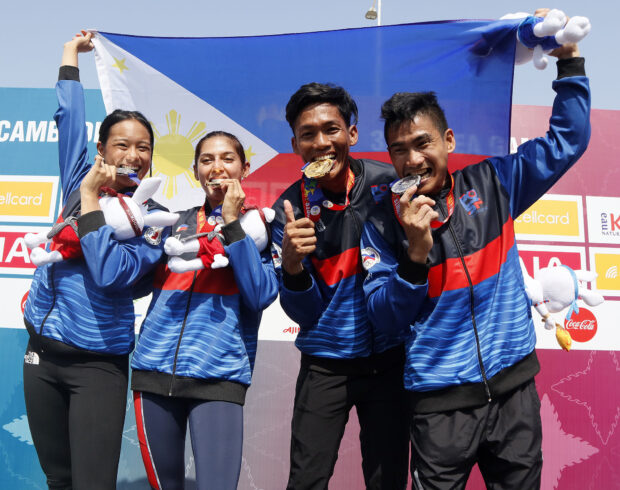
The national obstacle race team proved peerless in the Southeast Asian Games with Guinness-level performances. —TEAM PHILIPPINES PHOTO
The Southeast Asian (SEA) Games is getting a little bit too shallow for these dominant athletes.
Pocketing golds in the regional meet wasn’t enough for a handful of Filipino champions on Saturday as they began looking forward to bigger things after polishing the country’s medal count.
In fact, after leading a gold-silver finish for the men’s squad in the men’s individual 100-meter (m) race in obstacle racing, Mark Julius Rodelas was left to look at the bright side of missing on improving his world record in the event by a fraction of a second.
“There will be more chances to erase it. The Philippines still owns the records, all the world records,’’ said Rodelas after beating teammate Kevin Pascua by finishing the course in 25.19 seconds.
Pascua took the silver in 26.81 seconds.
“There was no pressure [in the final]. We came in relaxed and told ourselves that whatever happens, the Philippines remains the winner,’’ said Rodelas, whose sprinter and long jumper skills suited his abilities to hurdle those series of physically demanding obstacles.
Rodelas, a nephew of SEA Games and athletics legend Elma Muros-Posadas, set the record during the heats, where he clocked 25.09 seconds.
The Philippines also owns the women’s world standard in the event, courtesy of Games rookie Precious Cabuya, who spearheaded another 1-2 finish for the country. Unlike Rodelas, Cabuya logged her entry in the Guinness Book of World Records in the final, where she clocked 32.72 seconds to beat teammate Kaizen dela Serna (35.52).
“This is my biggest achievement so far, an unforgettable experience as this was my first SEA Games and [I] won a gold right away,” Cabuya, a 32-year-old fitness model, said. “I’m so happy I contributed a gold medal to our country and recorded a new time [world standard].”
The Philippines isn’t just dominating opponents on the obstacle course, but also in training gyms in other countries.
“Almost all the techniques being used to clear an obstacle [in the 100m] came from me. I scrutinize and study each barrier closely and think of ways to go over it as quickly as I can,’’ said Rodelas. “Other countries eventually adopted these techniques that I discovered.’’
Jiujitsu, karate
FILE – Filipino Jiu-jitsu fight Annie Ramirez wins another SEA Games gold medal. –ANNE RAMIREZ PHOTO
Jiujitsu and karate added two more golds to the Philippine haul, with the champions looking forward to bigger things ahead.
Jiujitsu’s Annie Ramirez won the gold in the women’s ne-waza nogi 57-kilogram (kg) event, using a knee bar to force Vietnam’s Thi Thuong Le into submission in the final.
After winning a third straight gold in the biennial meet, Ramirez is now training her sights on bigger competitions.
“I will participate in all the big events this year, including the Asian Games,’’ said the 32-year-old Ramirez, a former judo standout before making a shift to the sport where she was the Asian Beach Games champion in 2014.
It was the second gold for the jiujitsu team after Kaila Napolis became the first Filipino champion in Cambodia after frustrating Cambodian-Mexican Jessa Khan in the women’s 52-kg class on Thursday.
“The only thing I will ask for [from the Philippine Sports Commission and the Philippine Olympic Committee] is to support us in these tournaments,’’ said Ramirez.
Meggie Ochoa, also a multiple gold performer in the SEA Games, will take the mat on Sunday to defend her 49-kg title.
After obliterating the field in every competition she went to in just two months, Sakura Alforte is also ready for more challenges.
“I don’t know yet what’s in store for me in the coming years, but one tournament I’m looking forward to is the Asian Games,’’ said Alforte after getting 40.8 points from judges to rule the women’s kata individual event of karate.
Unmatched
Karate rising star Sakura Alforte.
The 20-year-old Filipino-Japanese kata specialist was unmatched in the Southeast Asian Championship recently in Manila and again proved her prowess in the Karate 1 Youth League in A Coruña, Spain, less than two weeks ago.
Alforte, another SEA Games first-timer, rode the wave of triumph once more on Saturday by collecting another gold as a newbie in the 11-nation sports fest.
“I’ve been thinking about the SEA Games for the past few months. I’ve trained hard and the work that I put in paid off,’’ said Alforte, a third-year international liberal studies student at Waseda University in Shinjuku City, who grew up in Manila before migrating with her family to Japan after high school.
Vietnam’s Phuong Nguyen, last year’s champion in Hanoi, finished second with 40.2 points.
Alforte’s gold redeemed a karate delegation that was empty-handed in the Vietnam edition of the meet last year.
But it wasn’t enough to ease the frustrations of teammate Junna Tsukii, who felt she had done enough for the gold but was robbed of her shot at glory after losing to Malaysia’s Chandran Shahmalarani in the final of the women’s-50kg kumite.
“How can I lose? I’m sure that I had the advantage and I was more active than her. But they chose her, so I don’t know what happened with the judge,’’ said Tsukii, who knocked down Shahmalarani twice in their duel.
But the Malaysian champion was able to level the count at 1-all before the fight got halted by the judges in favor of Shahmalarani.
“I’m not happy. It was a total disappointment. She was down, stepped back and I pressed on, but they gave it to her,’’ said Tsukii, who won the title in the World Games last year in Birmingham, Alabama.

